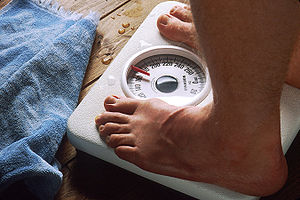
- Image via Wikipedia
There’s nothing better than a practical bit of effective help for a health problem. Except when it’s affordable – that’s when the news is superb! When it comes to binge eating, there have been very few effective treatments to offer. And the ones that existed were often long-term and expensive. In fact, many people with binge eating disorders often self-refer to diet or nutrition programs, which have not been shown to be that effective, and, in the case of many commercial diet-programs, may actually make the disorder worse. The onslaught of diet ads for bikini season, as well as the common stuff-the-house-with-candy ritual of Easter can leave many binge eating sufferers feeling particularly vulnerable.
Which makes this Kaiser Permanente Center for Health Research study, in the April edition of Journal of Consulting and Clinical Psychology, such a fabulous result to share. Binge eaters were offered either “usual care” – which means information about weight management, nutrition services and medical care. OR they were enrolled in a program they called “guided self-help.”
Guided self-help means that people who recognized they had a binge eating disorder, and wanted help, were given a book on practical advice that spelled out a 12-week course of self-assessment, and then they met with a health educator once a week for eight sessions. During this time, these same people kept food diaries and tried to identify triggers. The book that participants used is titled Overcoming Binge Eating. Neither the study sponsors (nor myself) have any affiliation – financial or otherwise – with the author or publishers of the book. The health educators used in the study are not trained psychologists – they, instead, acted more as “coaches” for the participants.
At one year, a whopping 63% of participants who used the guided self-help program reported that they stopped binge eating (and hadn’t relapsed), compared to 28% referred to usual care. In a CNN interview, the study’s co-author pointed out that some of the simplest tips were reported to be the most effective, such as not going for long periods without eating – which can precipitate a binge.
The flaws of the study are that the success is based on self-report, the age of participants was, on average 37, and, in order to be enrolled, participants had to already recognize that they had a problem and be seeking care for it.
Even so, this study is great news for the many, many people who suffer from binge eating and can’t afford an eating disorder program or regular, expensive therapy sessions. Besides the usual caveats that study results should be verified and repeated, I would also caution, strongly, against two probable shortcuts that people might make when trying to apply these results to everyday life. First, the people in this study wanted help. That is a key ingredient to success. That means that trying to force, cajole, or plead with someone you love to take this approach is unlikely to have the same success. Second, there is a tremendous amount of shame with eating disorders, and having the eight in-person health educator sessions is also probably a key ingredient. Stepping forward, sharing your experience, and getting encouragement is probably a crucial factor in destigmatizing and effectively addressing binge eating. The temptation may be great to quietly order the book from your local bookseller, then keep a secret food diary, and hope for the best. It might work, but when it comes to success, why not tilt the odds in your favor and get advice and support?
Got any tips or experience you’d be willing to share? Share in the comments section. Feel free to forward this along to others you think might be interested. Keep up on the latest health issues in the news by signing up for a Doc Gurley RSS feed by clicking here. Check out Doc Gurley – discover the weird, the wacky and the everyday symptoms you want to know about, as well as practical expert tips on staying well. Want to express your inner fan-girl/boy? Become a Doc Gurley fan on Facebook! Want to be on the inside, fast track of health news and tips? Jump on the Twitter bandwagon and follow Doc Gurley! Also check out Doc Gurley’s joyhabit and iwellth twitter feeds – so you can get topic-specific fun, effective, affordable tips on how to nurture your joy and grow your wellth this coming year.
Related articles by Zemanta
- Short-term program for binge eaters has long-term benefits (scienceblog.com)
![Reblog this post [with Zemanta]](https://i0.wp.com/img.zemanta.com/reblog_e.png?w=640)